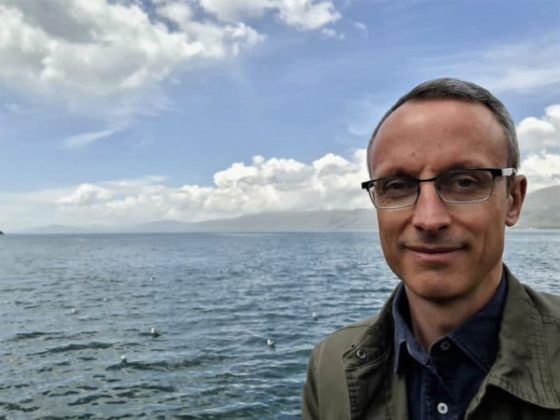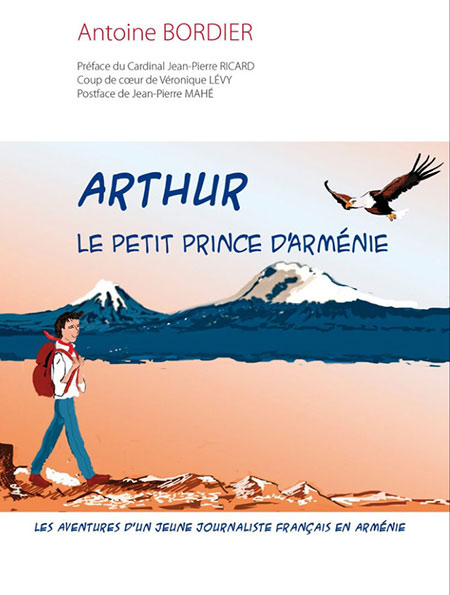by The Armenian Mirror-Spectator
Artsvi Bakhchinyan
I learned about the newly published French novel Arthur, le petit prince d’Arménie (Arthur, the little prince of Armenia) by Antoine Bordier while navigating online news and learned that the author happened to be in Armenia at that moment. We met very soon and talked about his book and more.
The journalist, consultant and writer Antoine Bordier was born in France and lives in Paris. Since his teens, he has written poetry and worked as journalist. He later studied law, economics and finance, worked as auditor, managed companies in Romania and Portugal, launching his own consulting firm. In 2018 he went back to journalism and became an author in 2021.
Antoine, this is your fourth time in Armenia.
That’s right. My first visit was last year. I came for an economic mission, to work as consultant in founding of a French company in Armenia. Then I was writing for Challenges, a newspaper covering economic topics. After that I visited again and stayed for a longer time to write my book. So I was writing my book from March to September 2021 in Armenia. It was like a dream. It was a new life for me. My ability to write was not new, yet it is different between writing an article as a journalist and novel. So Armenia inspired me to publish my first book. I visited Armenia twice this year. My book was published the day before my arrival. Now I am looking for an Armenian translator and publishing house.
Is there any interest from the media?
I was already interviewed several times by French media. Actually this is too new to speak about responses. In France, the media is too focused on Ukraine. We do not see the reality in Armenia; we are so blind.
Before your discovering Armenia what was your knowledge about the country and culture?
It was very limited. I knew only Charles Aznavour. I did not know about Great Armenia that existed in pre-Christian times, between the two seas, from Beirut to Baku — a very big territory indeed, while now it occupies only less than 9 percent of its historical borders. It was also great to know Armenian-French connections have a long time history, approximately after the beginning of Christianity here, perhaps since the 4th century.
Regarding economic issues, what do you recommend for Armenia?
This is a good question. There is a big potential here, but also big problems. The first problem is that you are divided, even if there are less than three million people in Armenia. I am a consultant, so I can say what Armenians in my opinion have to focus on. Firstly, agriculture should be more developed. It is great that brothers Vigen and Vahe Badalyan, along other projects, launched an agricultural mission. They have a good vision for their country. The Armenian government should ask the Diaspora to invest in agriculture. And to invest not in small parcels, (this is an old reality to change, from the 19th, not for the 20th or the 21st century), but you have to produce more both in quantity and quality. That means you have to involve the knowhow of Western experience. The second sector to invest in is IT. You have very good potential in IT and artificial intelligence. Another option might be the field of crypto money. Here people invest a lot in education; there are many cosmopolitan polyglot people which is excellent, but other fields also need to be developed. The nation should be organized around the agriculture and IT. I do not see another sector, although energy or diamond fields also might be alternative options.
But because of political situation many Diaspora Armenians avoid investing.
Yes and no. For instance, you recently had the AGBU assembly in Yerevan discussing development projects in Armenia. If Armenia and the diaspora remain divided, no developments will take place. That’s for sure.
L’union fait la force! (Unity is strength).
Absolutely! Due to the situation of the war, your enemies just wait until you get even more divided. You are alone, so you need to find not, let say, 50 projects, but two and three major developing projects to pursue. You need a vision. And you need key actors. You need a specific task force. By the way, the situation is not better in France. We also have no vision. For instance, we lost our sovereignty in energy, now French energy sector depends on other countries. The same is true for our industry; our commercial balance is so down, it is in deficit. But we are lucky, we do not have enemies on our borders. Here you have enemies on both east and west, so your population and nation need to be mobilized. You need unity. This is a question of survival.
When you are here, I assume you have heard lots of stories about 44-Day war of 2020, so you decided to write on that subject.
Although I am not personally part of your tragedy, it was difficult for me to write about this. I never interviewed soldiers, yet I listened a lot. I saw young people without their limbs. I saw the reality, so I can understand what happens when you have drones over your heads. I also have friends who took part in war.

Antoine Bordier
In Armenia we are the gatekeepers of civilization. That means you are the first civilization of humanity: because of Noah, of the history of the flood, because of Ararat. So if the door is broken down, that means all our civilization will fall, the rest of the world. That’s why we have to help you, to help the country to be free, to give the capacity to go on, to continue the life. I met the new generation in different places, in poor villages, and I see that you have a lot of capacities. But you need, of course, peace and unity. We are not in 1994, so you could not win again, as this time Azerbaijan has had Turkey and Israel helping. And it is not a good sign to invest a lot in your army: it is a sign of war, not peace. In reality, you have no choice: you must arm yourself, train and prepare your population to defend their homeland. Please remember: Azerbaijan after 1994 made continuous investments in their army and this allowed them to come back and win in 2020 and since September 13 continue their aggression towards Armenia.
Let’s go back to your novel. What is the main message of Arthur, the Little Prince of Armenia?
It is a triptych, three paintings. The first one is journalistic: the hero, Arthur, is a 20-year-old French man who lost his parents in car accident. Because of this tragedy, one needs to begin with something different: not to turn the page, but go toward new challenges, new adventures. That’s why Arthur comes to Armenia and as a young journalist he files many reports. This first painting is very realistic. The second one is an allegory with the story of our civilization, and with Christianity. In my books there is something like parabola. For example, Arthur meets Noah and Abraham. And he is able to be in various places at the same time. And the third part is fantastic. We understand that Armenia needs someone else. In the novel this “else” is a fantastic world, where queen Anahit reigns with a giant royal eagle, Aroso. And Arthur goes back to past and saves lives after the Spitak earthquake and during the war in Stepanakert. He also meets Komitas when he was arrested in 1915. It might be seemed messy, but I wanted to be very simple. We need to know our past and our roots: my novel’s message is to know who we are. We have to know our history, both good and bad sides of it. As Christians, we have to be more connected with the Bible. In the beginning it was God, but we are more and more ignorant about that and perhaps not in France, but also here. It is not enough to be the first Christian state, but also to know about your faith and Christianity. So, my book is a message for peace, for unity and for the defense of values, whether ancient or modern. Because values do not belong only to the past. Look, for example, more and more countries aspire to democracy which is an old philosophical concept taught by Aristotle and Plato. But, its reality is modern, and, rare, too.
Finally, Arthur is the little prince of fraternity, friendship, peace, unity and roots.
I am finishing two other books. And, Arthur will continue his adventures, in other countries.
























































